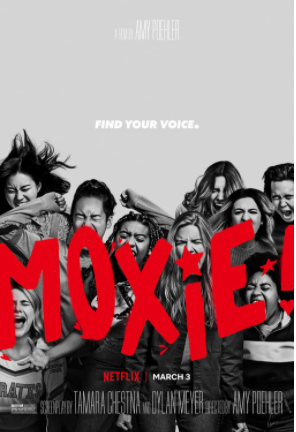Despite Efforts, ‘Moxie’ is White Feminism at its Finest
(mild spoilers ahead)
For a teenage girl, feminist and gigantic Leslie Knope fan (by extension, director and actress Amy Poelher), ‘Moxie’ was an exciting release. A shy teenager wanting to speak out against injustices is something that many people can relate to. Vivian, a shy teenager from Oregon, was inspired by her mother’s feminist past to speak out against the actions of her high school’s policies by starting a magazine named ‘Moxie’ anonymously. The film promised intersectionality, Poelher stating that she didn’t want to overstep past her perspective and highlight other struggles past the liberation of white women. Moreover, Moxie presents classic elements of a feminist piece of media, complete with magazines, teenage angst and a punk soundtrack. However, this charm doesn’t always work, as the movie relies on overused tropes and inadequate attempts at inclusion to create a call to action for a generation that probably doesn’t even need a movie dedicated to activism.
The diversity all served to benefit the main character, Vivian, a straight, cisgender, white girl. Her best friend Claudia is Asian, her feminist friend Lucy is Afro-Latina, and the only transgender or disabled characters are in the background and barely speak. This follows the pattern of several other movies, where the ‘gay best friend’ or ‘sassy black friend’ are included solely for the main character to learn an important lesson- diversity shouldn’t be for face. Actually exploring the causes and effects of intersectional feminism and gender, race and class in one film/book adaptation would be nearly impossible to talk about, but ‘Moxie’ never goes past mentioning that Vivian is privileged from her worldview. Just like Lucy, girls of color are more likely to be harassed in high school than anyone else, and her experience has racial undertones that aren’t expanded on. The script doesn’t revisit that Claudia feels that she can’t mess up because her immigrant parents sacrificed so much for her, a sentiment that many high school students share- Vivian halfheartedly apologizes and everyone moves on. Yes, Vivian doesn’t claim Moxie as her brainchild till the end of the movie and invites other people to share their experiences, but that is the bare minimum. She still gets upset after her nominee for Student Athlete Ambassador doesn’t win, blowing up at her mom and loved ones rather than focusing on what her friend felt and barely apologizes for her shortcomings. It feels like a checklist of identities was created and ‘Moxie’ doesn’t end up amplifying the voices it intended to.
Moxie’s portrayal of teenagers and activism is flawed. One of Vivian’s initial ideas was for those in support of ending the dress code at her school to draw hearts and stars on their hands. Characters in her English class protest against reading the Great Gatsby, but don’t take any action like talking to their teacher or administration. It’s almost cartoonish, and downplays the progress that teenagers today have made. In reality, young activists make an impact. The Pew Research Center found that Gen-Z are the most politically active generation since the 1960s era of hippies and anti-Vietnam war protests; 70% of young people today want a government which pays attention to activism as well. Most action comes through social media outlets such as Instagram and TikTok, signing online petitions and local peaceful protests. Although some critics find social media advocacy lazy and not true activism, nicknaming it ‘slacktivism,’ others say that social media is a good use of resources for young advocates and will revolutionize communication in the coming years. Similarly, Vivian’s magazine is paired with an Instagram account to spread information to the rest of the school, but it takes a backseat to the magazine that doesn’t end up accomplishing anything.
‘Moxie’ brings the importance of physical demonstration to an increasingly online generation, though Poelher’s potpourri of social issues packed into one movie might be too much to handle with little expansion on any of them, possibly turning some young activists away from feminism.
Your donation will support the student journalists of McNeil High School. Your contribution will allow us to purchase equipment and cover our annual website hosting costs.










